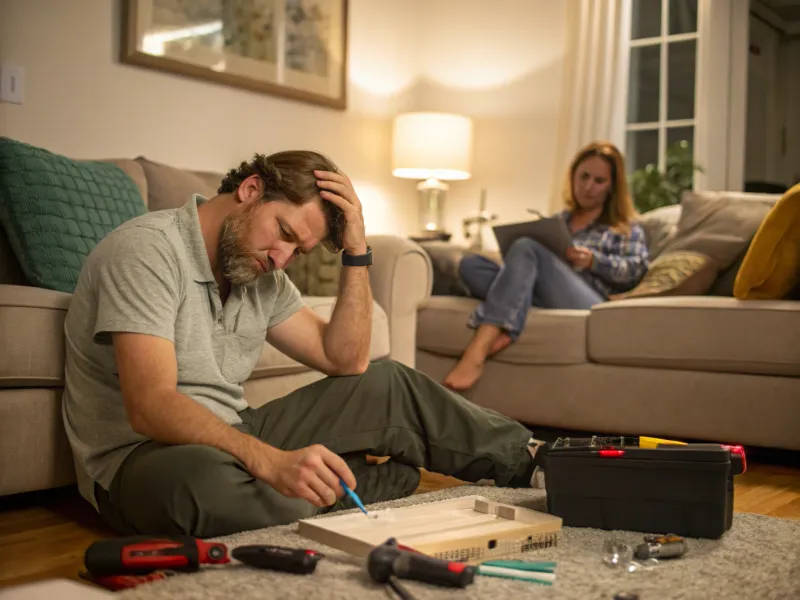34 Mistakes Married Women Usually Make That Cause Their Husbands To Pull Away
Emotional distance in a marriage doesn’t happen overnight. It’s often the cumulative effect of repeated behaviors or unaddressed issues that gradually build a wall between partners.
While every marriage is unique, certain patterns can emerge that cause husbands to feel disconnected, leading them to distance themselves. Understanding these patterns is crucial for maintaining a strong and loving relationship.
By recognizing the mistakes and addressing them, you can foster a more intimate and trusting connection with your husband.
Here is a list of 34 mistakes that some married women make, which often push their husbands away.
1. Criticizing More Than Appreciating

Criticism can corrode a marriage if it overshadows appreciation. When you focus more on what your husband does wrong than what he does right, it creates a negative atmosphere where he may feel constantly judged and inadequate. Acknowledging his efforts, whether big or small, can significantly impact his sense of worth and involvement in the relationship.
Imagine how disheartening it must be to feel that your attempts to contribute are overshadowed by your partner’s dissatisfaction. It’s essential to strike a balance by expressing gratitude and acknowledging his positive contributions more often. This doesn’t mean ignoring issues, but rather addressing them constructively while fostering a supportive environment.
A constructive way to address criticism is by using “I” statements that focus on how you feel rather than accusatory “you” statements. This approach opens a dialogue and minimizes defensiveness. Remember, the goal is to create mutual understanding and appreciation, which ultimately strengthens your bond.
2. Dismissing His Feelings

Emotional intimacy is the bedrock of a strong marriage, and dismissing your husband’s feelings can drive a wedge between you. When he shares his emotions, it’s crucial to listen empathetically rather than dismissing them as trivial or unwarranted. This shows that you value and respect his inner world.
Men often face societal pressures to suppress their emotions, making it even more important for you to be a safe space where he can be vulnerable. Recognizing and validating his feelings fosters trust and intimacy, allowing both partners to connect on a deeper emotional level.
To create a supportive atmosphere, practice active listening by acknowledging his feelings, asking open-ended questions, and offering comfort without judgment. This approach encourages him to open up more freely, enhancing your emotional connection and reinforcing the foundation of your relationship.
3. Neglecting Intimacy

Intimacy is not just about physical closeness; it involves emotional and intellectual connection as well. Neglecting these aspects can lead to feelings of isolation and detachment. When intimacy becomes an afterthought, it signals to your husband that your relationship isn’t a priority.
Physical affection and quality time together should be consistent, not reserved for special occasions. Without this, the emotional gap can widen, leading to resentment and emotional distance. It’s important to nurture your bond continuously, through gestures of love, shared activities, and meaningful conversations.
Rekindling intimacy involves being present and engaged, showing affection in everyday interactions, and making time for each other amidst busy schedules. This doesn’t require grand gestures; even small acts of love and consideration can speak volumes and strengthen your connection.
See also: 33 Ways To Rekindle Passion In A Stale Marriage
4. Making Him Feel Like He’s Always Failing

Constantly pointing out your husband’s perceived failures can erode his self-esteem and motivation. When he feels like he’s never able to meet expectations, it can lead to a sense of helplessness and frustration. This perception of failure can cause him to withdraw emotionally to protect himself from further disappointment.
It’s important to remember that everyone has strengths and weaknesses. Instead of highlighting his shortcomings, focus on encouragement and constructive feedback. Recognize his efforts and successes, no matter how small, to build his confidence and foster a positive environment.
Providing support rather than criticism encourages growth and cooperation. Approach challenges as a team, and celebrate achievements together. This partnership approach reinforces mutual respect and understanding, helping to maintain a healthy, supportive relationship.
5. Comparing Him to Other Men

Comparisons can quickly breed resentment and insecurity in a relationship. When you compare your husband to others—be it exes, celebrities, or friends’ spouses—it can make him feel inadequate and undervalued. This undermines his confidence and can lead him to emotionally distance himself.
Everyone has unique qualities and strengths, and it’s crucial to appreciate your partner for who he is. Comparisons often stem from unrealistic expectations or dissatisfaction, which should be communicated openly rather than through indirect comparisons.
Valuing your husband for his individuality strengthens your relationship. Celebrate his unique qualities and achievements, and address any issues by discussing your needs and expectations directly. This openness fosters understanding and a sense of security, allowing your relationship to thrive without the burden of comparison.
6. Prioritizing Kids, Work, or Friends Over Him

While balancing various aspects of life is challenging, neglecting your husband’s emotional needs can leave him feeling like an outsider. When other commitments consistently take precedence, it can signal that he’s not a priority, leading to feelings of neglect and disconnection.
It’s essential to make room for your relationship amidst the chaos of daily life. Allocate quality time to nurture your bond, even amidst busy schedules, ensuring that your marriage remains a priority.
Communicate openly about commitments and find ways to involve each other in different aspects of life. This helps maintain a sense of partnership and understanding, preventing feelings of isolation. Balancing responsibilities while prioritizing your relationship creates a supportive and fulfilling partnership.
7. Ignoring His Need for Respect

Respect is a fundamental component of any relationship, and overlooking your husband’s need for it can lead to profound disconnection. When his opinions, decisions, or contributions are consistently dismissed or undervalued, it can foster feelings of resentment and inadequacy.
Every individual deserves to feel respected and valued, and this is especially true in a marriage. Acknowledging and appreciating your husband’s perspectives and efforts show that you value his role in your life.
Nurturing respect involves active listening, valuing his input, and expressing appreciation for his contributions. By creating an environment where both partners feel respected and heard, you lay the groundwork for a strong, cohesive, and loving relationship.
8. Sweeping Problems Under the Rug

Avoiding confrontation might seem easier, but it often leads to unresolved issues accumulating over time. Ignoring problems doesn’t make them disappear; instead, it allows them to fester and grow, causing emotional distance between you and your husband.
Open communication is vital for addressing and resolving conflicts. By confronting issues head-on, you prevent misunderstandings and foster a deeper understanding of each other’s perspectives and needs.
Creating a safe space for discussions, where both partners can share their thoughts and feelings without judgment, is crucial. This approach encourages collaboration and problem-solving, strengthening your connection and ensuring a healthier, more fulfilling marriage.
9. Micromanaging Every Aspect of His Life

Micromanagement can stifle individuality and breed resentment. When you control every aspect of your husband’s life, it suggests a lack of trust and respect for his abilities, leading him to feel suffocated and undervalued.
Allowing space for autonomy and respecting his choices shows confidence in his capabilities. It’s important to strike a balance between guidance and independence, fostering an environment where both partners can thrive.
Encouraging open dialogue and collaboration helps build trust and mutual respect. By acknowledging his strengths and allowing him to take the lead in certain areas, you nurture a sense of equality and partnership, enhancing the quality of your relationship.
10. Failing to Communicate Openly

Communication is the cornerstone of any successful marriage, and failing to engage in open dialogue can lead to misunderstandings and emotional distance. When communication breaks down, it’s easy for assumptions and misinterpretations to take root, eroding trust and connection.
Being open and transparent fosters a deeper understanding of each other’s needs and perspectives. It’s essential to prioritize honest conversations, where both partners feel heard and valued.
Practicing active listening, expressing thoughts clearly, and addressing issues collaboratively are key to maintaining healthy communication. This approach prevents conflicts from escalating and builds a strong foundation for a lasting, supportive relationship.
11. Taking Him for Granted

Taking your husband for granted can lead to feelings of neglect and resentment. When his efforts and contributions go unnoticed, it diminishes his sense of value and importance in the relationship, causing him to distance himself emotionally.
Showing appreciation for both big and small gestures reinforces his significance in your life. Recognizing and acknowledging his efforts fosters a positive atmosphere, where both partners feel valued and loved.
Expressing gratitude regularly, through words or actions, enhances the emotional connection and strengthens your bond. This mutual appreciation lays the foundation for a supportive and nurturing relationship.
12. Living in the Past and Holding Grudges

Holding onto past grievances can poison the present. When you consistently bring up past mistakes or hold grudges, it prevents healing and growth, creating a barrier between you and your husband.
Forgiving and letting go of past conflicts is essential for moving forward. It allows for emotional healing and paves the way for a healthier, more positive relationship.
Focusing on the present and future, rather than dwelling on past issues, fosters a sense of renewal and hope. Open communication and a willingness to resolve conflicts promote a harmonious and fulfilling partnership.
13. Overlooking His Need for Space

Personal space is crucial for individual well-being and relationship health. Overlooking your husband’s need for space can lead to feelings of suffocation and resentment, pushing him to withdraw emotionally.
Respecting each other’s need for independence fosters trust and allows for personal growth. It’s important to strike a balance between togetherness and individuality, ensuring both partners feel secure and fulfilled.
Encouraging hobbies and interests outside the relationship enhances personal satisfaction, which in turn strengthens your bond. This balance nurtures a healthy, supportive, and resilient partnership.
14. Failing to Support His Dreams and Goals

Supporting each other’s dreams and aspirations is vital for a fulfilling marriage. When you dismiss or trivialize your husband’s goals, it can lead to feelings of inadequacy and frustration, causing him to emotionally distance himself.
Encouragement and support show that you value his aspirations and are invested in his happiness. Celebrating his achievements and providing motivation during challenges strengthens your connection.
Being a supportive partner involves active listening, offering constructive feedback, and helping him navigate obstacles. This partnership approach fosters a sense of unity and alignment, bolstering the foundation of your relationship.
15. Neglecting Emotional Vulnerability

Emotional vulnerability is key to deepening intimacy and trust in a relationship. Neglecting this aspect can lead to feelings of isolation and disconnection, as both partners retreat into emotional shells.
Being open and honest about your feelings fosters a safe space where both partners can express themselves without fear of judgment. This openness builds a stronger emotional connection and enhances mutual understanding.
Encouraging vulnerability involves active listening, empathy, and reassurance. By creating an environment where both partners feel safe to share their innermost thoughts, you nurture a deep, lasting, and fulfilling relationship.
16. Not Valuing His Opinions

Valuing your husband’s opinions is crucial for a respectful and harmonious relationship. When his thoughts and ideas are consistently dismissed, it can lead to feelings of insignificance and resentment, pushing him to distance himself emotionally.
Acknowledging and considering his perspectives fosters a sense of equality and partnership. It’s important to encourage open dialogue where both partners feel heard and valued, promoting mutual respect and understanding.
Creating a collaborative environment, where decisions are made together, strengthens your bond and reinforces the foundation of your relationship. This approach nurtures a supportive and cohesive partnership, ensuring long-term success.
17. Rejecting His Attempts at Affection

Affection is a vital expression of love, and rejecting your husband’s attempts at it can create a rift in your relationship. When his gestures of love are met with indifference or rejection, it can lead to feelings of inadequacy and emotional distance.
Embracing affectionate gestures enhances emotional intimacy and fosters a deeper connection. It’s important to be receptive to his expressions of love, reinforcing a sense of closeness and appreciation.
Encouraging and reciprocating affection involves being present and responsive to his needs. This mutual exchange of love and appreciation strengthens your bond and ensures a loving, supportive relationship.
18. Being Overly Critical of His Friends or Family

Criticism of your husband’s friends or family can create tension and division. When you’re overly critical, it puts him in an uncomfortable position, forcing him to choose sides or feel defensive about his relationships.
Respecting his relationships and maintaining a neutral stance fosters harmony and understanding. It’s important to address any concerns constructively, without undermining his connections.
Encouraging respectful dialogue and setting healthy boundaries promotes a supportive environment. By valuing his relationships and addressing issues thoughtfully, you strengthen your partnership and ensure a cohesive family dynamic.
19. Constantly Interrupting Him

Constant interruptions during conversations can erode communication and create feelings of frustration. When your husband feels that his thoughts are not valued enough to be heard fully, it can lead to emotional withdrawal and distance.
Listening actively and allowing him to express himself without interruption fosters respect and understanding. It’s important to create a space where both partners feel heard and appreciated.
Practicing patience and attentiveness during conversations enhances mutual respect and connection. This approach strengthens your communication and reinforces the foundation of your relationship, ensuring a strong and supportive partnership.
20. Neglecting to Resolve Conflicts

Avoiding conflict resolution can lead to unresolved issues festering over time. When conflicts remain unaddressed, they create barriers to emotional intimacy and understanding, driving partners apart.
Open and honest communication is essential for resolving conflicts effectively. Addressing issues directly and collaboratively fosters understanding and prevents misunderstandings.
Creating a safe space for dialogue, where both partners can express their feelings and perspectives, is crucial for conflict resolution. This approach promotes healing and reconciliation, ensuring a healthy and fulfilling relationship.
21. Failing to Share Responsibilities Equally

Inequality in sharing responsibilities can lead to feelings of frustration and resentment. When one partner consistently bears the brunt of household or familial duties, it creates an imbalance that can erode the partnership.
Collaborating on responsibilities fosters mutual respect and support. It’s important to discuss and distribute tasks fairly, ensuring that both partners contribute to the relationship and household.
Encouraging teamwork and communication helps maintain a balanced and harmonious partnership. By sharing responsibilities equitably, you strengthen your bond and promote a healthy, supportive relationship.
22. Being Overly Jealous or Possessive

Excessive jealousy or possessiveness can suffocate a relationship, creating feelings of distrust and insecurity. When your husband feels constantly monitored or mistrusted, it can lead to emotional withdrawal and distance.
Building trust and allowing personal freedom fosters a healthy and balanced relationship. It’s important to address insecurities constructively and encourage open communication about boundaries and trust.
Creating an environment of trust and understanding promotes emotional intimacy and connection. By respecting each other’s independence, you nurture a supportive and resilient partnership.
23. Holding Unrealistic Expectations

Unrealistic expectations can lead to chronic disappointment and frustration in a marriage. When your husband feels he can never meet your standards, it creates a sense of inadequacy and emotional distance.
Communicating openly about realistic goals and expectations is crucial for a supportive relationship. It’s important to focus on each other’s strengths and work together towards common objectives.
Fostering a collaborative approach, where both partners feel valued and supported, enhances mutual understanding and respect. This balance ensures a strong and fulfilling partnership, free from the burden of unrealistic demands.
24. Neglecting Self-Care

Neglecting self-care can lead to burnout and emotional exhaustion, impacting your relationship. When you’re unable to care for yourself, it’s challenging to be present and supportive for your husband.
Prioritizing self-care is essential for individual well-being and relationship health. It’s important to carve out time for relaxation, hobbies, and activities that rejuvenate you.
Encouraging self-care and supporting each other’s needs fosters a balanced and nurturing partnership. By investing in your well-being, you enhance your capacity to nurture a strong and supportive relationship.
25. Failing to Show Affection Publicly

Public displays of affection can reinforce your emotional connection and show unity. When your husband feels a lack of affection, especially in public settings, it can lead to feelings of rejection and insecurity.
Being comfortable with affection in public signifies a strong, supportive partnership. It’s important to express love and appreciation openly, reinforcing your bond and mutual affection.
Encouraging gestures of love and connection, both privately and publicly, enhances emotional intimacy and security. By nurturing a loving and affectionate relationship, you strengthen your bond and ensure a fulfilling partnership.
26. Not Being Present in the Moment

Being distracted or absent during shared moments can create feelings of neglect and emotional distance. When your husband feels that you’re not fully present, it signals a lack of interest and investment in the relationship.
Prioritizing presence and engagement fosters emotional intimacy and connection. It’s important to give each other undivided attention during shared moments, reinforcing your bond and mutual appreciation.
Creating a distraction-free environment, where both partners feel valued and heard, enhances communication and understanding. By being fully present, you nurture a strong and loving relationship.
27. Lack of Empathy During Conflicts

Empathy is crucial for understanding and resolving conflicts. When you lack empathy during disagreements, it can lead to feelings of isolation and misunderstanding, driving a wedge between you and your husband.
Practicing empathy involves actively listening and validating each other’s feelings, fostering a deeper emotional connection. This approach promotes understanding and collaboration during conflicts.
Encouraging empathy and compassion strengthens your bond and ensures a supportive and nurturing partnership. By valuing each other’s perspectives, you enhance mutual respect and understanding, paving the way for a harmonious relationship.
28. Relying Too Much on Him for Emotional Support

While seeking support is healthy, relying too heavily on your husband for emotional needs can create imbalance and strain. When he feels solely responsible for your emotional well-being, it can lead to burnout and emotional withdrawal.
Maintaining a balanced approach, where both partners support each other, fosters a healthy and resilient relationship. It’s important to seek support from multiple sources, ensuring a well-rounded emotional network.
Encouraging mutual support and understanding enhances your bond and promotes a nurturing partnership. By sharing emotional responsibilities, you build a strong and supportive relationship, resilient to challenges.
29. Being Overly Defensive

Defensiveness during disagreements can hinder communication and resolution. When you’re overly defensive, it creates barriers to understanding and collaboration, leading to emotional distance.
Approaching conflicts with an open mind and willingness to listen fosters mutual respect and understanding. It’s important to create a safe space for dialogue, where both partners feel heard and valued.
Encouraging openness and receptivity during discussions strengthens your bond and ensures a supportive and harmonious relationship. By minimizing defensiveness, you enhance communication and connection, paving the way for a fulfilling partnership.
30. Not Giving Him Enough Time Alone

Personal time is important for individual well-being and relationship health. When you don’t allow your husband enough time alone, it can lead to feelings of suffocation and emotional withdrawal.
Respecting each other’s need for solitude fosters trust and independence. It’s important to strike a balance between togetherness and individuality, ensuring both partners feel fulfilled and supported.
Encouraging personal time and hobbies enhances personal satisfaction and strengthens your bond. By allowing space for individuality, you nurture a healthy and resilient relationship.
31. Undermining His Confidence in Front of Others

Little jabs or sarcastic remarks might seem harmless in the moment, but consistently belittling your husband in public can chip away at his self-worth. Whether it’s correcting him mid-story, mocking his choices, or highlighting his flaws in front of others, these actions don’t just bruise his ego—they wound your connection.
Public respect is just as crucial as private support. When he feels exposed or humiliated, even subtly, it creates emotional distance that’s hard to recover from. It sends a message that he can’t trust you to protect his dignity.
Instead, support him openly and address concerns privately. Let him feel like you’re his biggest advocate, not his harshest critic. Respect in public builds trust in private.
32. Assuming He Doesn’t Need Reassurance

It’s easy to fall into the trap of thinking men don’t need emotional validation. But the truth is, just like anyone else, your husband wants to feel loved, wanted, and secure. Assuming he knows how you feel without ever saying it can leave him wondering where he stands.
When words of affirmation fade and affection becomes routine, he may start feeling unappreciated or emotionally disconnected. Everyone needs to hear that they’re valued—especially from the person they love most.
Make it a habit to reassure him—tell him you’re proud, that you’re grateful, and that he matters. These seemingly small affirmations can make a big difference in how emotionally connected he feels to you.
See also: 6 Alarming Signs Your Boyfriend Needs Alone Time
33. Over-Scheduling Without Communicating

Picture this: a woman with her planner, her days packed with commitments, from work meetings to social gatherings. Her husband sits nearby, feeling excluded from her world. When life becomes a race against time, communication falters. Without sharing schedules and intentions, partners can feel sidelined and neglected.
A simple conversation about plans can create a significant difference. Discussing priorities and making time for each other fosters understanding and connection. It’s not about eliminating responsibilities but about weaving love into the daily tapestry of life.
Finding balance requires effort but strengthens the marital bond.
34. Constantly Seeking Validation from Others

In a world where likes and shares become measures of worth, one might seek validation from screens rather than the comforting presence of a partner. Imagine a woman who turns to her followers for approval, leaving her husband feeling invisible.
The quest for external affirmation can erode the intimacy of marriage. Embracing each other’s opinions builds mutual respect and confidence.
Redirecting the need for validation towards genuine connections within the relationship can reignite the spark that social media dims, turning likes into loving gestures.







